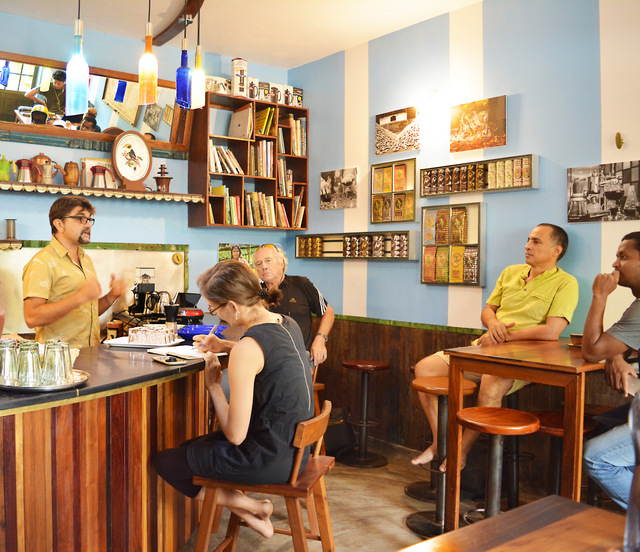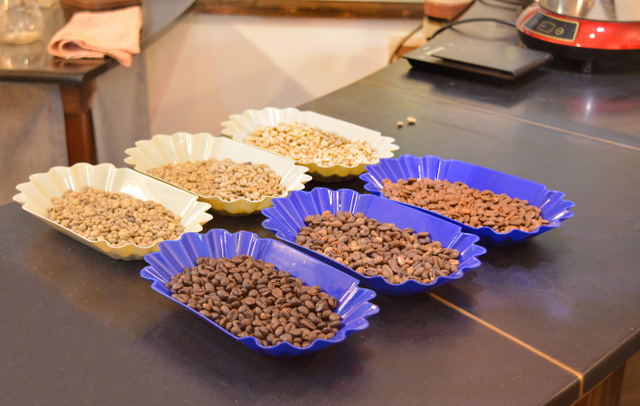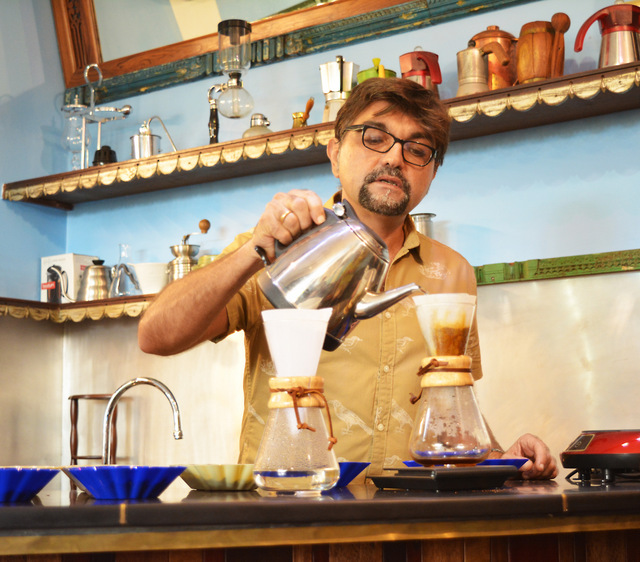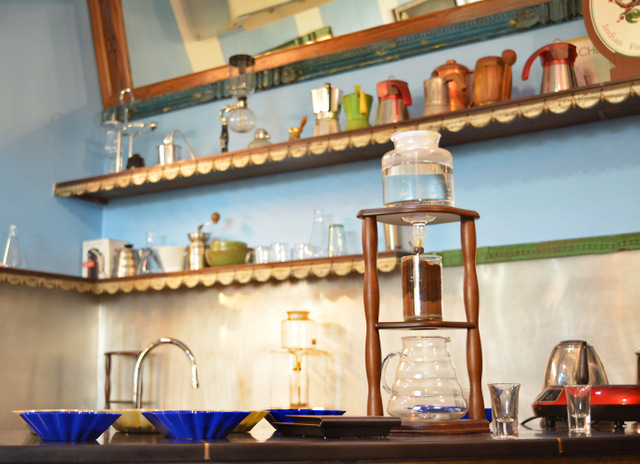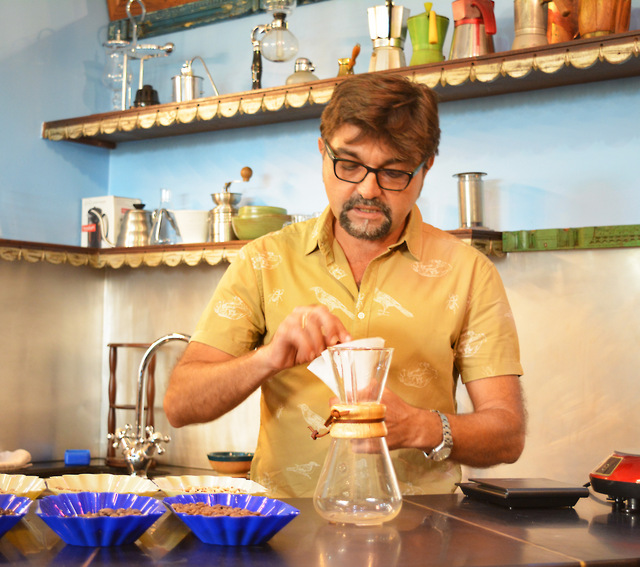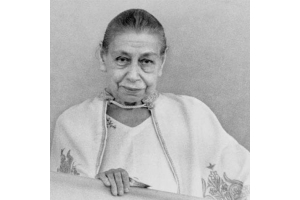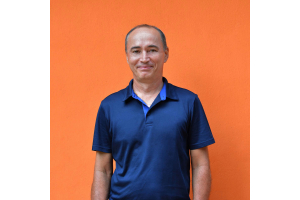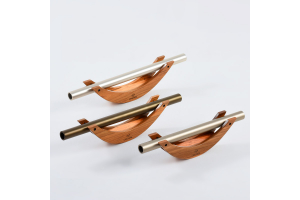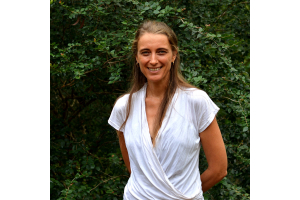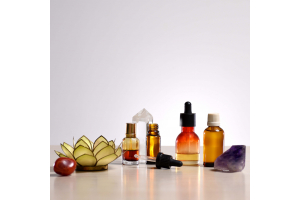Brewing Session Marc's Coffee
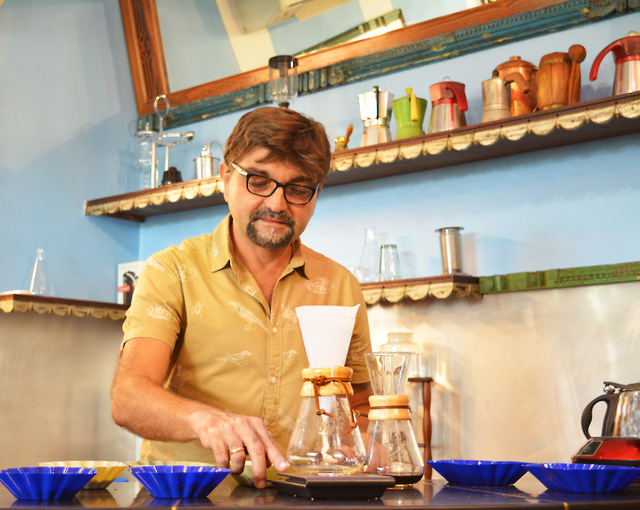
We have been working and collaborating with Marc from Marc’s Coffee since quite a while, so we were very happy when he invited us to a brewing session in his café and roast house.
Marc joined Auroville in 1996 and during that time he also started his research on high quality coffee grown and crafted in India. In 2008 he founded the Unit Coffee Ideas! which roasts the organic, fair-trade and UTZ-certified beans, and a café with a roast and taste soon followed in 2011. Furthermore Marc co-founded the popular Dreamers Café in Visitor Center, where an old container has a second life as a great coffee place and ice cream parlor.
But back to the brewing session that took place in the living room, a snug place in Marc’s Coffee situated in the entrance village of Auroville. While preparing the beans, cups and brewing devices Marc told us the tale of coffee. Originally coffee could be found all over South America but the only country in the world that grew and exported coffee was Yemen, and from their harbor, Mokha, the beans were shipped to places all over the world. To make sure that they would stay the only ones trading with the black gold they boiled the beans for a few seconds to kill the gem and make the seed unfertile. The tale says that an Indian sulfi discovered the magic black drink during a meditative dance of the dervishes. The sulfi smuggled seven beans to India planting the crops in the hills of Karnataka. Today India is in the top ten of coffee exporters in the world. We thank this sulfi every morning!
On the counter Marc prepared three types of coffee explaining that his core business is the roast which transforms the beans. Long years of research and experience have brought up a specific roasting technique that brings unique flavors. Before Marc roasts his beans they need to be collected and dried. He explains that there are three basic ways to do that. Number one is to dry the beans under the sun, these types are called natural coffees with a very fruity taste, because the natural sugar will stay inside the bean. The second way to process the bean is to remove the pulp with a pulper leaving just the bean, washing it and fermenting it afterwards. The length of the fermentation process depends on the traditional process of the farmer. The crafted coffee is called a speciality coffee because the process needs special care and attention at every single step. The third possibility of processing coffee is to remove the pulp but not ferment it afterwards, just naturally dry the beans under the sun. Marc explained (I quote) that between these three coffee types is a “huge huge huge difference, none of them is the best coffee, they are just very different”.
So which coffee to buy? In case you want a fruity coffee you would choose a naturally dried coffee like Buma Devi, which has a very sweet flavor. If the coffee bean is washed the sweet taste goes away, but other flavors emerge and these beans have a more citrus and spiceful note. The color of the beans also variate.
Furthermore there is a difference between Arabica and Robusta. Arabica is a longer and narrow bean while robusta is a round-shaped bean. With a smile on his face Marc went on to say that Arabica is the feminine side of coffee, giving you aroma and delicate tastes, while Robusta is the masculine side with a strong and full body. If you bring both together like yin and yang, you can craft incredible blends that have a beautiful balance; his Buma Devi is one of them with 50% Robusta and 50% Arabica. If you are looking for a wake up call go for a blend with more Robusta, if you would like to have a nice coffee in the afternoon Marc recommends an Arabica. Robusta has double the amount of caffeine compared to Arabica, so he recommends moving from Robusta blends in the morning to Arabica blends in the evening.
Robusta is, like the name explains, a more robust coffee that can grow in lower altitudes and is more resistant to pests. The Arabica plants require a higher altitude, more rain and a lot of care. Growing Arabica in an organic way is very difficult because pests cannot be treated with pesticides or chemicals. Farmers need to have a special understanding and knowledge about the crops; this is why certified organic coffees are usually higher priced.
So after all these great insights we finally brewed some coffee…We tasted three different brews that were made with different devices like a cold drip and a chemist machine. Marc recommended to grind the coffee by yourself because 50% of the flavor will be lost after a week of opening a pack of grinded coffee. Furthermore he advised to use 7 to 12 grams of coffee for an espresso, and that should be made with about-to-boil water at a temperature of 85C. The perfect serving temperature will then be 65C. While brewing the black gold he went on telling us that he fell in love with coffee when he was 23 years old and he never looked back. After leaving his coffee shop in Spain he went on a mission to supply the high quality coffee that is grown and harvested in India to the Indian market, rather than exporting it like everyone else. Ten years ago one of his main jobs was to go around and convince farmers to supply to him, but today they share his excitement and the word spreads.
We tasted the coffees with full attention, discussing flavors and learning about brewing techniques from various places. After two hours we were fueled on coffee, our bags filled with different blends and we were looking forward to the next cup of coffee.
If you too would like to have a brewing session then contact coffeeideas@auroville.org.in for details, or for a home brew shop Marc’s coffee here.
We are curious: what is your favorite flavor, Arabica, robusta, yin and yang?

